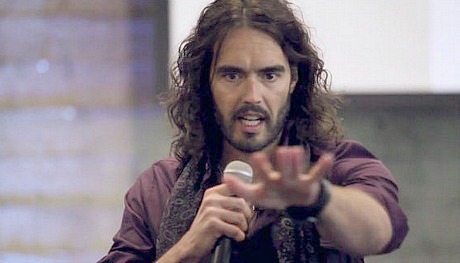I felt as if I’d been injected with an exciting spiritual drug when I first saw Ondi Timoner‘s BRAND: A Second Coming, which opens tomorrow. I’ve seen it three times since last March and have felt the same juices each time. Because it’s a film about transcendence — about the transformation of Russell Brand from hyper comic libertine to social revolutionary. I fell in love with the arc of his life, which is that he finally found his focus and got it right after floundering around (somewhat like Che Guevara, Jesus Christ, Mahatma Gandhi and Malcolm X, all of whom found their calling after an uncertain period in their 20s). He became truly interesting when he stopped projecting like a hyper, swaggering, shag-crazy narcissist and became a “champagne socialist” revolutionary and began saying “look at what’s wrong here”…that’s when Brand became a lightning bolt.

Russell Brand, director Ondi Timoner during final shooting on BRAND: A Second Coming.
I wrote last March that Timoner’s doc (partly shot by HE’s own Svetlana Cvetko) is “one of the most unusual and impressive documentary portraits of a famous person I’ve ever seen because of…well, its eagerness to step out of the standard function of a documentary and take the proverbial ride. It’s a film that transcends itself and becomes something else by embracing the attitude and temperament of its subject. Just as Brand has begun moving the focus of his life beyond fame and wealth and the lowest form of humor (i.e., simply making people laugh), Brand: A Second Coming is about seeing and transcending and turning a page.”
Through all the excitement I chose to ignore Brand’s decision not to travel to Austin to help promote Timoner’s doc, which basic professional courtesy required. Brand explained that despite his admiration for Timoner’s film that he wasn’t comfortable discussing the portion of her doc that covers his sex, drugs & rock ‘n’ roll period (i.e., roughly the first 40 minutes).
I also looked the other way when he got together with Michael Winterbottom to make a somewhat similar documentary, The Emperor’s New Clothes, that covers a lot of the same material in Timoner’s film. Clothes was barely paid attention to on these shores, but the most forgiving person in the world would have to admit this was a huge dick move on Brand’s part.
Remember that Brand hired Timoner a couple of years ago to try and fix a doc he’d been making called Happiness. The film wasn’t uninteresting, Timoner felt, but was basically about Brand interviewing Mike Tyson, David Lynch, Oliver Stone, 50 Cent and Cameron Diaz about what made them happy. But there was very little of Brand himself. When Timoner showed up for a meeting to offer notes, she was surprised to find Brand in attendance, and soon after realized that his attitude and personality were what the film needed. She sold him on this and wrangled creative control.
So they went to work and Timoner recreated the film and it became BRAND: A Second Coming, and then when it was done Brand turned around and said “oh, no, no…it’s too personal!” and refused to do publicity, and he also helped to create a competing documentary with Winterbottom? Who behaves this way?

And now Timoner’s film is opening tomorrow and Brand is still keeping his distance from it, not offering the slightest support or attention…nothing. He worked with Timoner on the making of the damn thing, and the doc tells the absolute truth about where he used to be and is today. It makes him look bold and a little crazy but at the same time fearless and crackling with energy and certain that he’s following the right path. It’s hugely flattering, in short, and there’s really no earthly reason for Brand to have given Timoner’s film the cold shoulder. At the very least what he’s done is ungentlemanly.
It’s hard to open any film these days — hard to heard above the noise — and we all know that BRAND: A Second Coming would be opening bigger tomorrow if Brand had agreed to do some print and TV interviews and make the usual appearances. The doc tells his story, his life — it delivers the whole shebang, chapter and verse, and it tells no lies. Just as there are no lies conveyed by Brand’s behavior in this matter. He’s shown that he can be a serious shit.
Brand has been sober since ’04, and if you know anything about sobriety you understand you have to be able look at your past and say “okay, that happened…that’s who I was.” 90% of every confession I’ve listened to at an AA meeting has been about what a wreck the speaker was before he/she became a Friend of Bill. Any sober person who refuses to admit their past mistakes or is looking to suppress memories of same is in a very curious place. And Brand can double-fuck himself on this score because he agreed with Timoner’s vision of the doc and worked with her to make it happen in the right way. So I no longer feel love for the guy. I admire what he’s done with his life and agree with everything he said during his “Messiah Complex” tour, but only a selfish twat would have done what he did to Timoner.

Ondi Timoner, director of Brand: A Second Coming.

Russell Brand
Written last March: “Brand is partly advocating a kind of Iceland-styled social revolution by way of consciousness raising and neighborhood organizing and more compassion for drug addicts and fierce resistance to most of the goals and systems of 1% corporate dominance, and partly calling for the debunking of conservative myths about individual fulfillment through the acquisition of power, money, sex, property, etc.
“Brand is rich so who’s he to talk, right? His response is to swear over and over that he’s been to the very top and gotten drunk on luxury and debauch and that none of the spoils are particularly fulfilling. He genuinely sees himself as a kind of change agent in the vague tradition of Malcolm X, Jesus of Nazareth, Mahatma Gandhi and Che Guevara. I realize this will rub some the wrong way, but what’s wrong with choosing these fellows as heroes and wanting to follow in their path? Brand’s obviously an eccentric, but he has the aura of a guy who’s really seen through the bullshit.
“Born in June 1975, Brand first gained fame as a nervy, drug-addicted stand-up comedian, award-show m.c. and televized provocateur. He became sober in ’04 and got into transcendental meditation but continued to provoke and challenge and piss people off. His first big American-fame injection came, of course, from starring roles in Forgetting Sarah Marshall, Get Him To The Greek and Arthur. But gradually the focus of his comedy became more and more political, and Timoner’s film comes alive when this phase, which kicked in sometime around 2012, takes over. We’re speaking of a phase in which Brand has more or less forsaken narcissism in and of itself (well, mostly) and has resolved to be, as he explained during a relatively recent q & a, ‘the people’s narcissist.'”
Brand: A Second Coming runs about 115 minutes, give or take. The first 40 minutes are about the hyper, nervy, occasionally drugged-up provocateur and his many episodes of offense and outrage as he performed, shagged scores of women, made films, etc. (The story, in other words, recounted in Brand’s “My Booky Wook.”) The last 75 minutes are about the sober, meditating, socially engaged guy that he gradually grew into — the guy who wrote and performed Messiah Complex, who created The Trews (i.e., Brand’s YouTube channel), who wrote “Revolution.”
I understand the structural necessity of the doc covering the first 40 minutes (you have to start at the beginning of any tale and tell it as honestly, thoroughly and economically as possible) but I loved the last 75.
Timoner began shooting with Brand during the summer of 2013, and even then “I really don’t think he had any of this transitional stuff on my mind,” she says. “He hadn’t created the Trews…hadn’t written the Messiah Complex tour…hadn’t written ‘Revolution’ It wasn’t orchestrated. Sometimes these films are bigger than we are. I hope people will consider Russell’s journey as it relates to their own…the virtues of breaking the rules, stepping out of line.
Brand, as noted, was not entirely pleased with the process of being filmed and invaded, and tried to set limits. He and Timoner tested each other, poked at the boundaries. Brand called Timoner his “ginger ninja shadow” at one point. Theirs was a difficult push-pull relationship but they gradually found a sort of rapprochement. Brand was impressed but unhappy when he saw the final cut; he felt it was too revealing or invasive and asked for extra material to be shot and inserted. Timoner’s creative control was contractual but she obliged nonetheless. And now look what’s happened.
